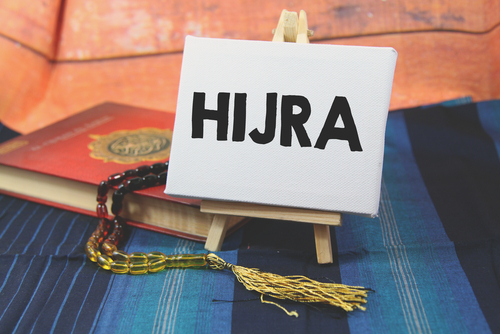By Dr. Ali Al-Halawani

The Hijrah witnessed a number of extraordinary incidents that show Allah’s perfect care for His Prophet.
If greatness of historical events is measured by their constructive influences and decisive resultant effects on the motion of life as well as the march of human beings on earth, the value of such events is – besides this – known through the elevated morals, noble principles and ethical demeanors that co-occur with these events.
Hence, the Hijrah event was by all measures an outstanding milestone. It yielded great fruits, displayed lofty principles and values in action, and expounded Prophet Muhammad’s (peace and blessings be upon him) prominent skill in planning as well as putting his whole trust in Allah the Almighty.
This can be seen in so many situations and incidents that took place throughout the course of Hijrah. Some of these will be cited here to help Muslims emulate them and put them into action in due, similar contexts. Two of the many perfect aspects of the Prophet’s personality that appeared during the Hijrah event will be highlighted here: the Prophet’s paramount ability to plan, and putting his full trust in Allah following observing all the possible material means.
Perfect planning
No doubt the Hijrah witnessed a number of extraordinary incidents that show Allah’s perfect care for His Prophet and his personal safety. Foremost among these is the fact that Allah provided him with unseen aides besides showering mercy and tranquility upon him. The Qur’an states this as saying: “And Allah sent down His tranquility upon him and supported him with soldiers [i.e., angels] you did not see.” (At-Tawbah 9:40)
However, the flow of incidents was guided by the natural laws set by Allah to manage this present life and govern all that takes place therein. This can be seen in what follows.
- As soon as the Prophet (peace and blessings be upon him) was commanded to emigrate to Madinah he entrusted Abu Bakr As-Siddiq (may Allah be pleased with him), his closest friend and companion, with the information. Two she-camels were purchased and prepared for the journey by the latter. The Prophet agreed to take one of them for himself, known as Al-Qaswaa’ afterwards, provided that he would pay its price.
- In order to deceive the Quraishites, the Prophet (peace and blessings be upon him) told `Ali ibn Abi Talib (may Allah be pleased with him), his cousin and companion, to sleep in his bed and cover himself with his green mantle and assured him full security under Allah’s protection and told him that no harm would come to him. It is remarkable that `Ali was then less than twenty years old!
- The Prophet (peace be upon him) hired a guide who knew the desert’s pathways very well to guide them throughout the way to Madinah to ward off any possibility of getting lost. It is also remarkable that the guide who is known by the name `Abdullah ibn Urayqit was then still a disbeliever. However, the divinely-guided Prophet hired him on the basis of having two basic qualities: professional experience as a guide and his well-known honesty.
- When the Prophet (peace be upon him) and Abu Bakr set out for Madinah they went out from the latter’s house through a skylight or a wicket in order to evade the Quraishites who were resolved on capturing them.
- In order to further camouflage their escape, the Prophet and Abu Bakr took an unusual route to Madinah. Instead of taking the road to Madinah in north side of Makkah as the polytheists would expect, they walked along a least expected road south of Makkah leading to Yemen. They reached the cave known by the name Thawr where they stayed for three days until the search for them lessened.
- `Abdullah ibn Abi Bakr used to mix with the Quraishites in their gatherings in order to collect information and then visit the Prophet and his father at the cave to apprise them of the latest situation in Makkah. His sister, Asmaa’ bint Abi Bakr (may Allah be pleased with her) used to carry food provisions to the Prophet and her father twice a day. In addition, `Amir ibn Fuhairah who was tending his master Abu Bakr’s flock, used to follow both `Abdullah and Asmaa’ to erase their footprints. This is due to the fact that the Arabs were famous for tracking and through these footprints they could have figured out which road the Prophet and his companion have taken and the whole plan would have failed.
- The great caution exercised by the Prophet and Abu Bakr in all their actions throughout the journey; whoever asked Abu Bakr about the identity of his honorable companion (i.e., the Prophet), he would reply that he was a man who guided him on his way. The questioner would think that Muhammad (peace and blessings be upon him) was a guide, in terms of roads, whereas Abu Bakr used to mean guide to the way of righteousness. (Al-Bukhari)
- Thus, using his wit, Abu Bakr answered the questioner without revealing the Prophet’s identity or resorting to telling lies.
- Choosing Madinah as the final destination was not a passing thought or a mere chance. Rather, it was a well-studied decision and a predetermined fate. This is due to the strategic geographic location Madinah then enjoyed that would give the forthcoming Muslim state a great influence on stirring events and happenings all over the Arabian Peninsula. Added to this the unique demographical structure as it encompassed the three Jewish tribes: BanuQainuqa`, BanuQuraizah and Banu An-Nadir side by side with the Arabs who belonged to the Aws and Al-Khazraj tribes. Besides, the people of Madinah had amicable relations with Da`wah as they met with the Prophet (peace be upon him) twice in `Aqabah where they swore allegiance to him. Thus, they were prepared for receiving Muslims as well as the Prophet as a first step towards establishing the first Muslim state.
In this pattern that is characterized by putting the Prophet’s full trust in Allah as well as cherishing the material means or natural laws set by Him in the universe, the Hijrah incidents succeeded in a row. The Prophet (peace and blessings be upon him) was so protected and supported by Allah Almighty that all the Quraishites’ malicious schemes were defeated. It was Allah’s Will that the plans of Prophet Muhammad succeed and those of the disbelievers fail. He says in the Ever-Glorious Qur’an: “Allah has already set for everything a [decreed] extent.“ (At-Talaq 65:3) And, regarding DhulQarnain, Allah says: “Indeed, We established him upon the earth, and We gave him to everything a way [i.e., means]. So he followed a way.“ (Al-Kahf 18:84-85)
In a narration by Imam Ahmad on the authority of Asmaa bint Abi Bakr that she said: “We prepared food provision for them… they set out going around the mountains of Makkah until they found the mountain which they chose as their [temporary] resort. Upon seeing a man in front of the cave, Abu Bakr said, “O Prophet of Allah! He could see us!” The Prophet replied, “No! There are angels that cover us with their wings”. The man sat to relieve himself facing [the mouth of] the cave. Thereupon the Prophet said, “If he could see us, he would not do that.” (Musnad Ahmad)
Despite all the efforts the Prophet has exerted to camouflage the Hijrah event and maintain its secrecy, the Quraishites reached the mouth of the cave where he and Abu Bakr were hiding. This means that when the required human effort is exhausted, comes the aid from Allah Who never lets down or abandons His Prophet and/or his worshippers in a way that may deliver them to His and their adversaries.
The Almighty reaffirms this meaning in the Qur’an that He will protect His Prophet when he is forsaken and/or unattended by all other supporters. The companions were scattered at that time as many of them have emigrated to Madinah earlier, while some remained in Makkah. Thus, the Prophet (peace be upon him) had no one else left beside him at that very time except Allah and Abu Bakr…
If you do not aid him [i.e., the Prophet] – Allah has already aided him when those who disbelieved had driven him out [of Makkah] as one of two, when they were in the cave and he [Muhammad] said to his companion, “Do not grieve; indeed Allah is with us.” And Allah sent down His tranquility upon him and supported him with soldiers [i.e., angels] you did not see and made the word of those who disbelieved the lowest, while the word of Allah – that is the highest. And Allah is Exalted in Might and Wise. (At-Tawbah 9:40)
Thus, following taking care of all material means in terms of planning and preparing for the action, the Prophet put his trust in Allah and declared his complete dependence on Him Alone and he earnestly directed his face along with his heart towards Allah seeking His mercy, guidance and assistance. In short, the Prophet (peace be upon him) put his trust in Allah without negligence of material means.
This is a great lesson that needs to be learnt by each and every Muslim who should have strict faith that Allah’s help will descend when one’s human means are exhausted and that s/he should be confident that victory is always from Allah who states: “And victory is not except from Allah, the Exalted in Might, the Wise.” (Aal `Imran 3:126)
To conclude, human effort in the world of observing material means cannot be neglected or made little of by Muslims especially those who shoulder the responsibility of inviting others to the way of Allah under the pretense of depending on Allah and leaving everything to Him.
If Prophet Muhammad – though was well protected by Allah – observed all possible human material means to make his plan work out, no doubt we would be more entitled to observe all possible means and use all our cunning and planning skills to make our designs succeed. We have to do all what we can then leave the results to Allah Who knows better than any of His creatures.
[opic_orginalurl]

